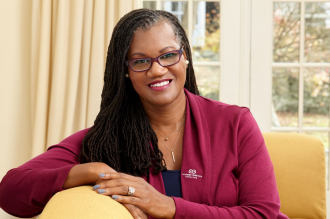Betty White once said, “I may be a senior, but so what? I’m still hot.” She was known for her unstoppable attitude and great wit, qualities that doubtless contributed to her long and robust life.
I recently spent several wonderful days with my parents, siblings, daughter, stepson and husband. Since my octogenarian parents take a “Betty White” approach to life, the time together was filled with joy and laughter. With three generations under one roof, I found myself surrounded by great strength of spirit. Some had the advantage of youth on their side while others had the benefits of longevity. All of us understand the importance of cherishing our minds, taking care of our bodies and nourishing our souls. When our time together ended, I was grateful for the parents who raised me and the example they still provide.
Yet even a positive outlook, healthy diet and physical activity won’t prevent all ills. My family is managing high blood pressure, high cholesterol and type 2 diabetes, much like more than half of U.S. adults. According to the Centers for Disease Control and Prevention (CDC), chronic conditions affect approximately 52% of the adult population.
Illness is not failure
Developing a health condition or illness with age “is not failure. It’s an inevitable part of the life course for most of us,” says Mark Lachs, M.D., co-founder, executive vice president and chief gerontological officer of Compass Care in Stamford and chief of geriatrics and palliative medicine at Weill Cornell Medicine.
By age 75, people generally develop two to three chronic medical conditions, some serious, some not. He sees his role as an orchestra leader who interprets needs and harmonizes the advice of specialists, allowing patients to “continue doing what they love.”
Lachs advises older patients to avoid unnecessary hospitalizations and take control of their care. Know what meds you take — generic and brand name — and carry a copy of your cardiogram and the latest set of lab results. A geriatric care manager can be your advocate. Partner with a primary care doctor to understand the rationale for every specialist and avoid dangerous overtreatment.
Keep enjoyment in your diet
Eating healthfully becomes increasingly important as we age.
Pat Talio, a registered dietitian with Westmed Medical Group, says, “While nutrition guidelines for older adults must be individualized, research shows us that energy efficiency decreases in older adults. To ensure proper nutrition as we age, we need to focus on the nutrient density of the foods we eat and avoid taking in discretionary calories that lack nutritional value.”
For most people, the enjoyment of food influences quality of life. While medical conditions often dictate choices, restrictions should not inhibit pleasure. Skillful recipes make the most of “quality” foods — vegetables, whole grains, legumes, fruit, fish and other lean proteins such as poultry and low-fat dairy.
“If you experiment, you’re bound to discover that a food you’ve never tried will become a favorite and a staple,” says Talio.
Stay active
Joseph Hunt, CEO and owner of Elite Fitness Professionals, is a personal trainer and corrective exercise specialist in New Rochelle who works with many older clients. He says, “As we age, the goal of physical activity becomes more focused on mobility to avoid disability so adults can age and function independently.”
A fall and possible hospitalization can significantly restrict day-to-day functioning. Reduced mobility or even losing the ability to bathe or cook for oneself may affect a person’s overall confidence and self-esteem and could lead to depression.
While many seniors stay active in their 80s and beyond, it is common to encounter some limitation. To counteract this, identify the source: Is it strength, balance, coordination, flexibility, joint range of motion, gait or cardiovascular health?
Says Hunt, “Even the least mobile individual can start training in a chair or use a railing for assistance and balance. The body is highly adaptive. Learn your body. Don’t try to transform it initially. The consistent effort alone will boost your self-esteem and morale.”
Healthy mind = healthy body
Neglecting mental health imperils a person’s total well-being.
Faith Gunning, Ph.D., associate professor of psychology in psychiatry with the Weill Cornell Institute of Geriatric Psychiatry in White Plains, says, “There is strong evidence that individuals with untreated mental-health issues also suffer from the common health conditions that increase with age, including diabetes mellitus and heart disease.”
While the link could be genetic, a depressed person may be less likely to keep doctors’ appointments, adhere to medications, engage in regular exercise, follow a healthy diet and maintain good sleep habits.
There is, she says, a paradox: “While many older adults have an increased sense of emotional well-being, those who are depressed may be less likely to respond to standard approaches, such as antidepressants. A subset of older adults with depression also experience some cognitive difficulties.”
Consequently, Gunning says, “We and others have designed and are testing cognitive and psychotherapy approaches to improve cognitive and mood symptoms.” Simple steps such as improved diet and regular exercise and remaining cognitively and socially active can aid in normal aging.
Nourish the soul
Feeding the soul is equally important to all, be they people who belong to an organized religion or those who shun belief and worship.
Connections & Equipping Pastor at New Life Fellowship Church Sherin Swift notes, “Most religions challenge us to look beyond ourselves, to find our place in a larger purpose. Culture in the U.S. exalts the individual, often with disregard for others or at the cost of the larger community.”
She points out that while there is value in a shared faith that provides a clear set of values, history and a purpose for gathering, “a cure for our myopic attitude can also be found around a shared cause.”
Becoming active by joining a nonprofit organization can “keep the spirit from languishing and protect the heart from bitterness.”
Yet the self should never be neglected. Swift advises us to “invest both in ourselves and others. Some seasons of life will require more of one and less of the other, but ultimately our best work for our community comes when we’ve invested time understanding and healing our internal world.”
Caring for one’s mind, body and soul throughout life will reap rewards. It is never too late to start.
For more, visit concierge-care.com.
It’s never too late for seniors to be sound in mind, body, heart and soul. WAG eldercare columnist Abbe Udochi gets the scoop on how to do it from some local experts.



I enjoyed this article. I am a 72 year old who is trying very hard to stay fit in both mind and body. Good advice from nutritionist Patti Talio!